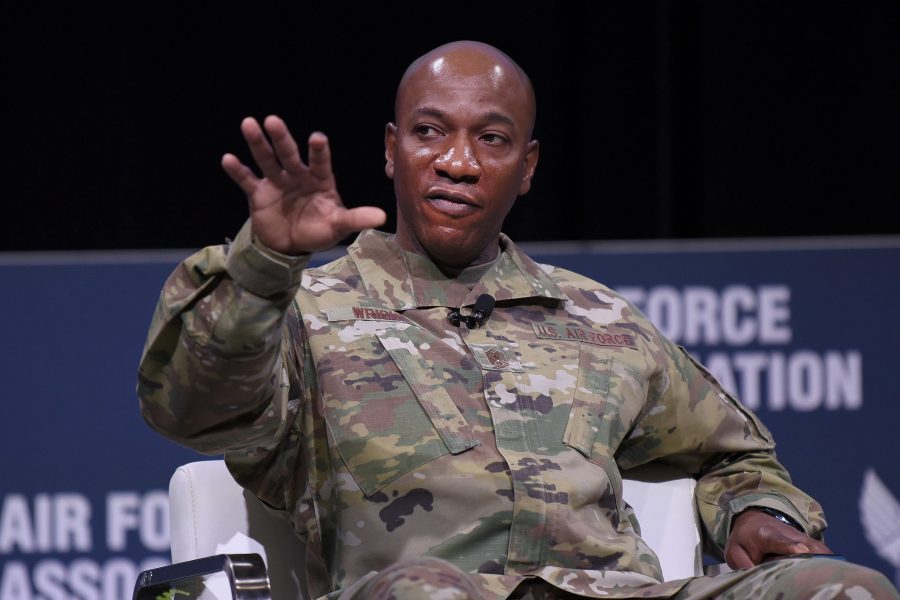In an interview with Air Force Magazine at AFA’s Air Warfare Symposium, Chief Master Sergeant of the Air Force Kaleth Wright outlined his top four priorities for the last six months of his tenure as the service’s top enlisted leader.
Enlisted Performance Reporting
The Enlisted Performance Report system has been a complex thorn in the side of all enlisted airmen for years. Wright is determined to change the system for the better before he leaves, saying the focus should be on helping Airmen improve as opposed to punishing them for shortfalls.
“The biggest priority is redesigning our enlisted evaluation system,” Wright told Air Force Magazine. “… Integrating technology into placing a greater focus on performance feedback and coaching, as opposed to just the performance reporting, which has been the majority of what our system has been focused on in the past.”
Right now, feedback is “almost a four-letter word,” and changing that will require a culture shift, he said. No one gets excited to get feedback. If an Airman is asked, “’Hey, come by the office I want to give you some feedback.’ If you’re in the Air Force, you get a little bit nervous and start sweating, try to figure out: What did you do? How can I explain it away? So yeah, we’ve got to fix that. That’s a real big problem.”
Weighted Airman Promotion System Tests
Wright is still pushing to get rid of the Weighted Airman Promotion System Tests. Currently, Airmen competing for promotions to staff sergeant and technical sergeant are judged on their EPRs, promotion fitness examination, and this specialty knowledge test.
“I don’t think we need WAPS testing as part of this redesign,” Wright said. “I have a high level of confidence that it will go away. Not everybody believes that though.”
To make this happen, Wright’s office is working the data to prove to senior leaders “this is the right thing to do for our Airmen when it comes to their development and promotion.”
Bereavement Leave
Currently, Airmen need to use regular leave days in the event of a family member’s death or similar emergency. Wright wants to create a new leave category to avoid that, but he acknowledged there’s been some push back and he needs “some help” from Congress and the Joint Staff to make it happen.
Wright said he could understand making an Airman use regular leave if there wasn’t already 21 other categories of leave that an Airman can take for things such as playing basketball, finding a house, or getting certain surgeries, etc.
“Given that we already allow Airmen to go and do all kinds of different things in this permissive TDY category. … This to me would be the priority,” Wright said.
Wright wants to give commanders the discretion to decide how much time an Airman can take off after a loved one has died, though he said the expectation would be about five to seven days. “Take whatever you think you need to get your affairs settled and when you’re ready to come back, come on back. This is as easy as that,” said Wright, adding he’s received some help coming from service leaders.
Physical Training Tests
On the issue of physical training, Wright said the major changes under his tenure have been job-specific PT tests, and the idea of a “no-fail” PT test, where an Airman can take a test and it will count if they pass, but it would serve as a diagnostic test if they fail, giving the Airman a chance to improve and take the test again.
The goal of these changes has been to change the culture of physical training and health in the Air Force. Being healthy should not be a “carrot and stick” approach of a one-time reward for passing a test, which is then forgotten about until the next one comes around. Also, an Airman shouldn’t face repeated blows, including negative marks and possible expulsion from service, based on the test.
Wright wants fitness to be a part of who Airmen are, saying they should be physically fit, have good dietary habits, focus on getting the right amount of sleep, “and not worry so much about the tests,” he said. Tests should show “the basic level of fitness and heart health that someone in the Air Force should have,” he said.
With Wright’s tenure winding down, he said he plans to help the next Chief of Staff pick his successor. While it isn’t his own decision, “I have influence” and there’s two-to-three chiefs in mind that could be a good fit for Chief Master Sergeant of the Air Force No. 19.
When that chief is named and takes over, Wright said he wants that person to “have the confidence to be themselves, to do whatever they see best, and not at all be worried about disappointing me or anybody else about changing any policy or anything that we did on my watch. I want them to be totally and completely confident that they are in the seat and they can do what they need for the Air Force.”
